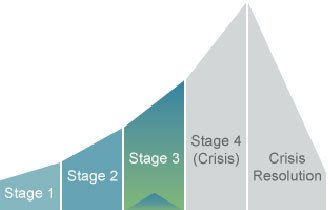How do I know if I’m depressed?
Am I depressed? It’s a question I hear quite often. Depression can come on slowly. And like a frog in the slowly heating pot, we get used to depression as it incrementally takes over our mood, our thoughts, and our behaviors. Then one day we wake up, look around, and say, “How did it get this bad?” And by the time we put a name to it, it may have completely altered our lives. But even then, it’s not too late.
When getting help for depression, sooner is better. Depression has a way of taking things away from us. It can take our energy, our feeling of connection, our ability to feel pleasure, our sense of agency or accomplishment, our sense of purpose, and even our will to live. Each thing depression steals from us makes us more vulnerable to the next theft. Unfortunately, most people wait to get help until the wheels start to come off.
Sometimes clinical depression is caused by a life crisis. It could be an expected life change like moving away from home for the first time or the loss of an elderly parent. Or it could be an unexpected trauma like surviving an assault or becoming disabled. Depression can also be caused by a prolonged period of stress such as a difficult work environment. Here are the main signs of depression.
Problems sleeping — You used to sleep fine, but for a few weeks or more sleep has been difficult. You’ve been unable to get to sleep or you awaken throughout the night.
Food issues— You used to have a good appetite but for a few weeks or more you’ve had no appetite, or—the reverse—you find yourself binging or ‘comfort eating’ more than usual.
Energy is lacking— For a few weeks or more, you’re unable to get the energy up to do stuff, maybe you can’t get off the couch or out of bed.
Concentration issues— A change has come where, for a couple weeks or more, you’ve had difficulty focusing on work, or paying attention long enough to read a book or watch a show.
Self-image and confidence decreased— Your self-esteem has taken a dive or come down noticeably, and maybe you “don’t recognize yourself.”
Ongoing thoughts of death or suicide— You may have thoughts that the world or your family would be better off without you, or feeling like you just want it all to end. There might be thoughts about how/when to kill yourself. *If you’re thinking about killing yourself, you can dial 988 on your phone to reach a trained counselor 24 hours a day.
Irritability— Some people find that they are not lacking energy, but instead have a lot of anger and are constantly irritable or have quick mood swings. This is especially true for teens who are experiencing depression.
If any of these things are bothering you, speak with a therapist to help sort what’s going on. You don’t have to settle for things getting worse. And you don’t have to do it alone.
When should I get help for depression?
Studies show that most Americans don’t seek help until they are approaching the fourth and final stage of crisis. Stage one shows mild symptoms and warnings. Stage two brings difficulties with daily tasks. By stage 3, symptoms are piling up and effecting multiple areas of a person’s life, their relationships, work, self-esteem, physical health, etc. They feel their resources are exhausted and they’re about to hit a serious wall.
Why wait any longer? There is nothing to lose by reaching out, and everything to gain back. And if you’ve already lost a lot, don’t despair. No matter how far down the ladder we’ve fallen, we can always get back up. It’s never too late to seek treatment.


